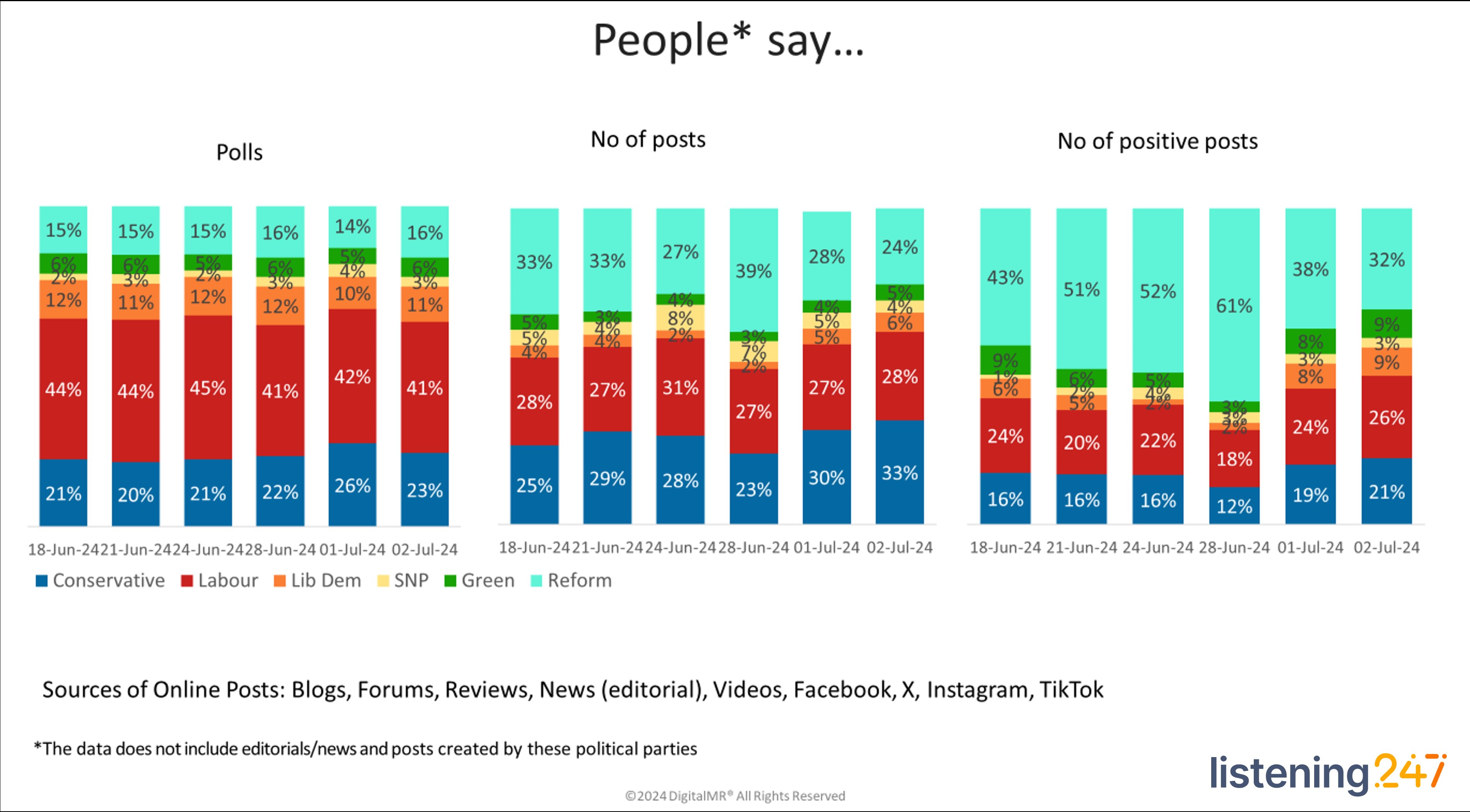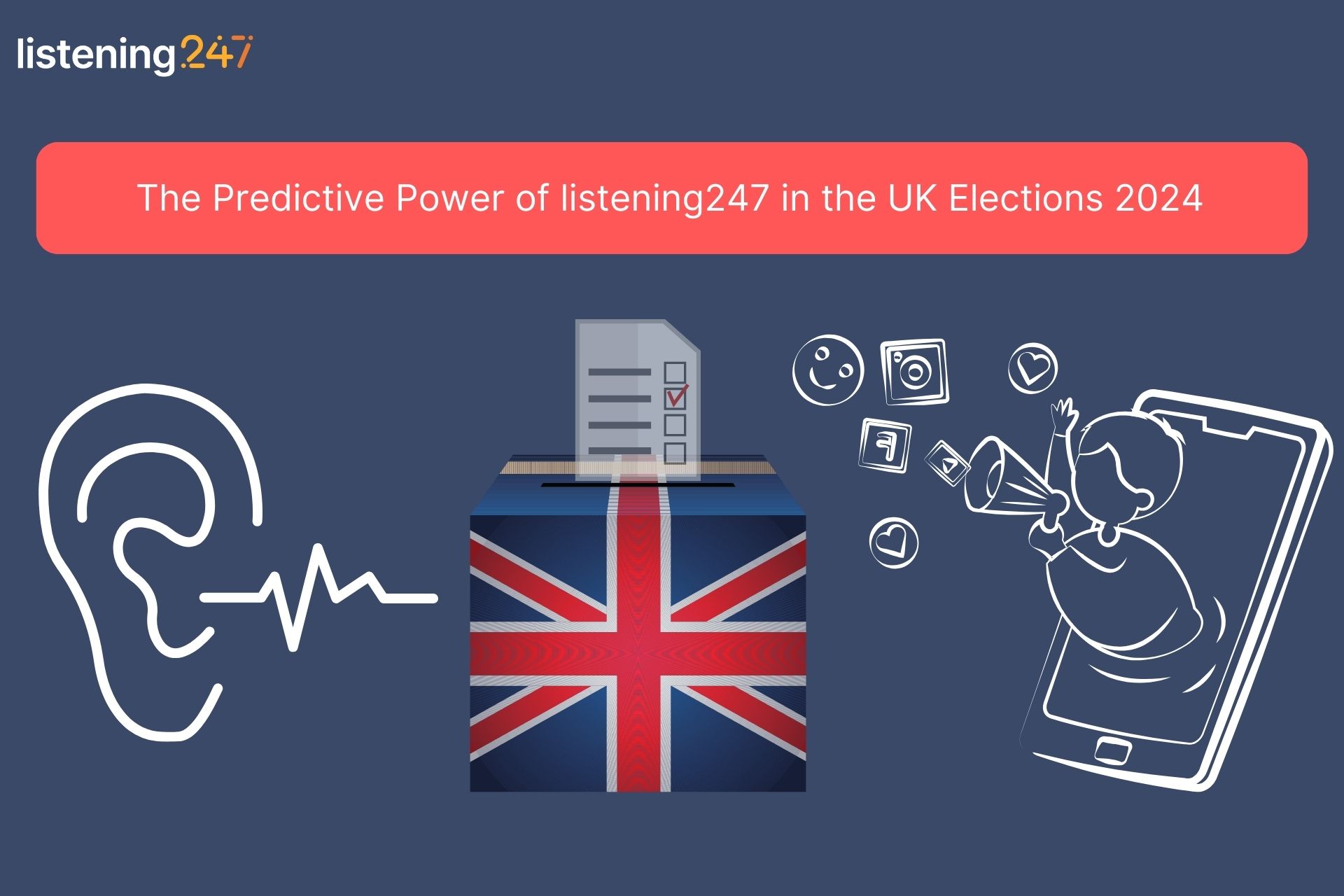
listening247 In the Press
UK Elections - voter opinion on social media is telling a different story than the polls!
In the bustling arena of UK politics, the recent general elections revealed a significant evolution towards technology-driven electoral analysis. listening247 proprietary solution showcased its ability by not only analysing but also dabbling in predicting election outcomes, drawing from its earlier success in the South African elections.
Insights and Impact of listening247 in Voter Analysis
During a critical two-week period – from June 17 to July 2 - leading up to the UK elections, listening247 processed an extensive dataset comprising 704,413 online posts mentioning the participating parties across key platforms such as X, Facebook, YouTube, Instagram, TikTok, and various news outlets, blogs and fora. This robust analysis provided a deep dive into the unsolicited opinions of UK voters, offering a rich layer of insight that augmented traditional polling methods which are based on the solicited voter opinion.
listening247 highlighted a notable trend: despite its lower profile in conventional polls (projected at 16% Fig. 1), Reform UK demonstrated significant influence on social media topping the rankings with number of positive sentiment posts overall (39% share Fig. 1) and number of posts that show preference in voting for a party (61% share for Reform UK but dropping to 32% Fig. 1). This anomaly may be a critical data point, especially considering the hesitation among some voters to declare their support for a far-right party in polls, hinting at a potential electoral surprise. Of course on July 1st and 2nd something changed in this respect and Reform UK lost the advantage to the extend we saw on June 28th. This is going to be a learning moment for our predictive capability.
Detailed Predictive Analysis and Voter Engagement
Labour has the most followers on social media, followed by the Conservatives and Reform UK. Yet, when it came to engagement and positive sentiment, Reform UK again unexpectedly led the charge. This discrepancy underscored the unique ability of listening247 to detect detailed voter sentiments and engagement, beyond mere follower counts.

Fig. 1
Key electoral issues such as taxation, Brexit, and immigration dominated online conversations, resonating deeply with the electorate. All parties recorded negative sentiments on these critical issues, a trend consistent with broader European sentiments, yet listening247 effectively dissected these complex dialogues to forecast electoral leanings.
Proven Methodology and Strategic Forecasting
listening247 employs a sophisticated blend of data collection, sentiment analysis, and noise filtration, specifically tailored to navigate the multifaceted political landscape of the UK. This methodological rigour enabled it to make some predictions for the election results, building on the successful prediction models used in South Africa.
Despite the UK's diverse political environment, listening247 demonstrated its robust capability to deliver precise and actionable insights, affirming its role as a critical solution in contemporary political strategy.
Social Media's Pivotal Role in Political Dynamics
With an *83% penetration rate among eligible voters, social media is now indispensable in UK political campaigns. listening247’s analysis revealed that while Labour enjoyed the highest number of overall posts, Reform UK captured the lead in positive engagements, pointing to evolving strategies in political communication.
Enhancing AI-Driven Electoral Analytics
listening247 is set to further enhance its algorithmic precision and broaden its application across various demographic and linguistic landscapes. The success in the UK elections serves as a testament to the potential of AI solutions to transform electoral strategies and deepen our understanding of voter behaviours.
Conclusion
The UK elections have highlighted the indispensable role of advanced digital analytics in deciphering complex voter behaviours and effectively predicting election outcomes. As AI technology continues to evolve, the synergy between polls and unsolicited voter opinion expressed online is poised to offer more accurate predictions, fundamentally changing the landscape of political engagement.
Embracing the innovative spirit, authenticity, and empowerment that define listening247 at the forefront of redefining political analysis, providing campaign teams and analysts with the tools needed to navigate the complexities of voter interactions with unmatched precision and insight.
* There are approx. 45 million voters registered in the UK. The social media penetration is 83% which basically covers everyone who is of voting age. Election turnout in 2019 was 67%.
Origal Source: UK Daily Ledger
